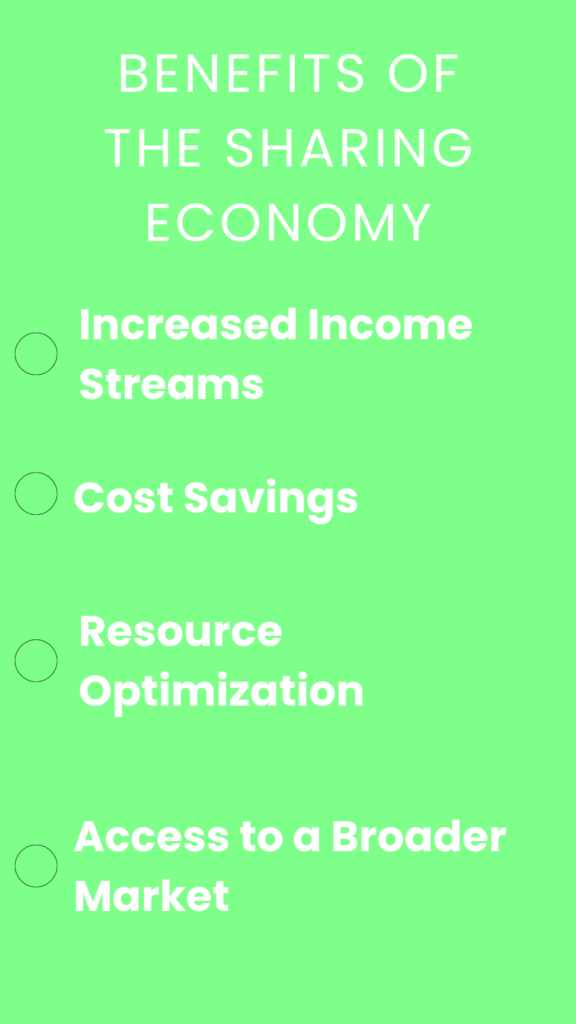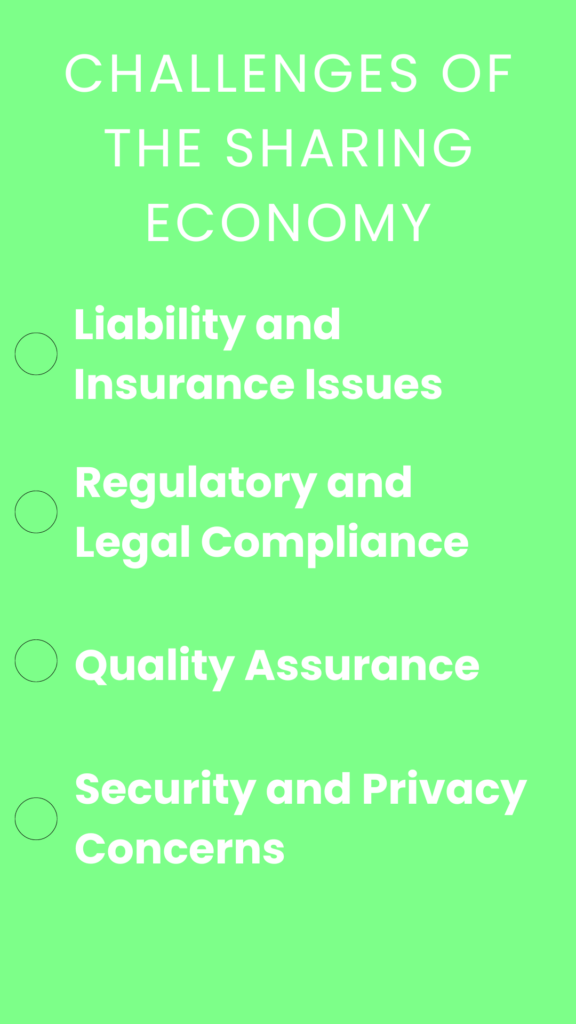
In the modern era, the sharing economy has become a revolutionary approach to conducting business. We, as consumers and entrepreneurs, have embraced the model of peer-to-peer exchanges to unlock new opportunities and maximize the utilization of underused assets. This article will dive deep into the financial benefits and challenges of renting and sharing assets, highlighting the potential for growth and the necessary considerations when participating in the sharing economy.
What is the Sharing Economy?
The sharing economy, also known as the collaborative economy, is an economic model that enables individuals to share assets, services, or expertise with others for a fee or exchange. These transactions typically occur through online platforms, connecting people with specific needs to those who can fulfill them. The sharing economy fosters a sense of community, sustainability, and resource optimization.
Evolution of the Sharing Economy
The sharing economy emerged in the early 2000s with the advent of the internet and advancements in technology. As internet connectivity and smartphone usage increased, digital platforms became more accessible to a broader audience, enabling its growth. The 2008 financial crisis also played a role in its growth, as people looked for alternative income sources and more affordable access to goods and services.
Characteristics of the Sharing Economy
In the sharing economy, individuals become micro-entrepreneurs, providing goods or services to others through various online platforms. Some key characteristics of the sharing economy include:
- Peer-to-Peer Transactions: Transactions are directly between individuals rather than through a centralized intermediary. This allows for more flexible and customized exchanges.
- Access Over Ownership: Instead of purchasing and owning goods, consumers can temporarily access them as needed, reducing the burden of ownership and maintenance.
- Digital Platforms: Technology and digital platforms play a crucial role in connecting providers and consumers, facilitating transactions, and ensuring trust.
- Community-Based Approach: The sharing economy thrives on community engagement and interaction. Trust is a crucial element, and many platforms have rating and review systems to build credibility.

Benefits
Renting and sharing assets in the sharing economy offers numerous financial advantages, providing both providers and users with profitable opportunities.
Increased Income Streams
Asset owners can generate additional income by renting or sharing their assets with others. This extra revenue can come from items that would otherwise sit idle, such as a spare room, an unused car, or specialized equipment.
Cost Savings
By participating in the sharing economy, consumers can access goods and services without the high upfront costs of ownership. Whether renting a designer dress for a special occasion, borrowing tools for a home improvement project, or sharing a ride, users can save money on one-time or occasional needs.
Resource Optimization
Renting and sharing assets contribute to a more efficient allocation of resources. It maximizes the usage of available assets, reducing waste, and minimizing the need for new purchases. This efficient utilization can stimulate economic growth and reduce environmental impact.
Access to a Broader Market
The sharing economy opens up a broader market for both providers and users. Providers can reach a global audience through online platforms, and users can access vast goods and services that might not be available locally.

Challenges
Although the sharing economy offers numerous financial benefits, it’s essential to consider the challenges that may arise when renting and sharing assets.
Liability and Insurance Issues
Participating in the sharing economy may expose providers to increased liability risks. Whether it’s property damage, theft, or personal injury, providers need to ensure they have adequate insurance coverage to protect themselves from potential claims.
Regulatory and Legal Compliance
The sharing economy often operates in a grey area of regulation. As a result, providers may face legal and regulatory challenges, such as zoning laws, licensing requirements, or tax obligations. Participants need to be aware of and comply with local, state, and federal regulations.
Quality Assurance
Maintaining a high standard of quality is crucial for providers in the sharing economy. Negative reviews or unsatisfied customers can significantly impact the ability to attract future business. Providers need to ensure their assets meet user expectations and provide a positive experience.
Security and Privacy Concerns
The sharing economy relies heavily on digital platforms for transactions, which can raise concerns about data security and privacy. Participants need to take precautions to protect their personal and financial information and be wary of potential fraud or scams.

10 Tips for Using Sharing Economy Platforms Safely and Wisely
The sharing economy offers numerous benefits, but it also presents challenges and risks that users should be aware of. To make the most of the sharing economy, follow these tips for safe and wise use of sharing economy platforms:
1. Do Your Research
Engaging in the sharing economy requires careful research to ensure that the platform you’re considering is reputable and reliable. Take time to investigate the platform’s track record by checking online reviews, ratings, and testimonials from other users. Go beyond the platform’s website and look for reviews on independent sites or social media. Look for patterns in the reviews – are there consistent complaints or praises about specific aspects of the platform? Furthermore, consider the platform’s history and any news coverage that may highlight its practices, partnerships, or controversies. This will give you a well-rounded view of the platform and help you make an informed decision.
2. Read the Terms and Conditions
Before signing up for any sharing economy platform, it’s crucial to read the terms and conditions carefully. These documents outline your rights and responsibilities as a user and provide insight into the platform’s policies and practices. Pay special attention to sections that cover cancellation and refund policies, fees or charges, dispute resolution procedures, and data privacy. It’s essential to understand what you’re agreeing to before you commit, and to ensure that the platform’s policies align with your expectations and comfort level.
3. Verify Identities and Credentials
In the sharing economy, you’re often dealing with individual providers rather than established businesses. As a result, verifying identities and credentials is crucial to ensure your safety and the quality of the service. For example, if you’re using a ridesharing service, check if the driver has undergone a background check and holds a valid driving license. If you’re renting a room through a home-sharing platform, confirm that the host is the actual owner or authorized to rent the property. This due diligence is vital to prevent fraud, ensure quality service, and protect your interests.
4. Use Secure Payment Methods
Secure payment methods are vital when participating in the sharing economy. Instead of using cash or direct bank transfers, opt for secure methods like credit cards or verified online payment platforms like PayPal. These options offer greater security, as they provide transaction records, fraud protection, and the possibility of chargebacks in case of disputes. Avoid platforms that insist on untraceable or insecure payment methods, as this could indicate a lack of transparency or potential for fraud.
5. Maintain Privacy
Protecting your privacy is essential when using sharing economy platforms. While it’s necessary to share some personal information to complete transactions, be mindful of what you disclose. Avoid sharing information that’s not required for the transaction, such as your home address (if not relevant) or social security number. Use a dedicated email address for sharing economy platforms, and consider using a virtual phone number to keep your primary number private. Regularly review the platform’s privacy settings and update them according to your comfort level.
6. Set Clear Expectations
Before engaging in any transaction, it’s crucial to set clear expectations with the other party. Discuss and agree on the terms of service, payment, duration, and any other relevant details. Ensure that both parties have a mutual understanding of what’s expected to avoid misunderstandings or disputes later. Consider using written agreements for more significant transactions to provide a record of the terms and protect both parties.
7. Communicate Openly and Respectfully
Open and respectful communication is key to successful transactions in the sharing economy. Address any concerns or questions that arise during the process promptly and courteously. If issues arise, approach the other party with a problem-solving mindset rather than an adversarial attitude. By fostering positive communication, you’ll enhance your experience and build a good reputation on the platform.
8. Follow Local Regulations
Sharing economy platforms may operate in regulatory gray areas, depending on your location and the specific service offered. Be aware of local laws and regulations that apply to the platform you’re using and ensure compliance. This could involve zoning laws, licensing requirements, tax obligations, or insurance coverage. Research local requirements and consult legal or regulatory authorities if you’re unsure.
9. Review and Rate Honestly
After completing a transaction, leave an honest review and rating based on your experience. Constructive feedback helps other users make informed decisions and encourages providers to maintain high standards of service. Share specific details about your experience, both positive and negative, to provide valuable insights for others. Remember, your reviews contribute to the trust and credibility of the sharing economy community.
10. Trust Your Instincts
Lastly, trust your instincts when using sharing economy platforms. If something doesn’t feel right, be cautious and ask questions. Don’t feel pressured to proceed with a transaction if you have doubts or concerns. Prioritize your safety and comfort above all else. Remember, it’s always better to be safe than sorry.
By following these tips, you can navigate the sharing economy safely and make the most of the opportunities it offers.
Conclusion
The sharing economy has ushered in a new era of financial opportunities and transformed how we perceive ownership, access, and economic exchange. Its rise has empowered individuals to become micro-entrepreneurs and has democratized access to resources, goods, and services, paving the way for more convenience and cost savings. By renting or sharing underutilized assets, individuals can generate additional income, optimize the use of available resources, reduce waste, and tap into a broader market.
However, it’s important to acknowledge that the sharing economy also brings challenges that require careful consideration. Liability and insurance issues, regulatory compliance, quality assurance, and security concerns are some of the hurdles that participants may face. Navigating these challenges requires awareness, research, and proactive measures to safeguard one’s interests and ensure a positive experience in the sharing economy.
Following best practices, such as researching platforms, verifying identities, using secure payment methods, and maintaining open and respectful communication, can mitigate risks and enhance the sharing economy experience. It is essential to be well-informed, exercise caution, and trust one’s instincts to make the most of the opportunities the sharing economy offers.
In conclusion, the sharing economy holds immense potential for financial growth and resource optimization. By understanding its benefits and challenges and adopting a thoughtful and responsible approach, participants can unlock new opportunities, contribute to a more sustainable and inclusive economy, and enjoy the numerous advantages that come with sharing and collaboration. As it continues to evolve and shape the future of business and commerce, embracing its possibilities and addressing its challenges will be key to maximizing its benefits for all involved.
FAQs
- What is a sharing economy platform?
- A sharing economy platform is an online marketplace that facilitates the direct exchange of goods, services, or resources between individuals. These platforms connect people with specific needs to others who can fulfill those needs. It leverages technology to create a community-driven marketplace, promoting resource optimization, sustainability, and peer-to-peer interactions.
- Is Airbnb a sharing economy platform?
- Yes, Airbnb is a prime example of a sharing economy platform. It allows homeowners or renters to list their properties as short-term accommodations for travelers. Users can book these properties directly through the platform, creating a peer-to-peer lodging service that offers an alternative to traditional hotels.
- Is Netflix a sharing economy platform?
- No, Netflix is not considered a sharing economy platform. Netflix is a subscription-based streaming service that provides on-demand access to a vast library of movies, TV shows, and original content. It operates on a centralized model, where content is provided by the platform itself, rather than through peer-to-peer interactions between users.
- Why is the sharing economy booming?
- The sharing economy is booming due to several factors, including technological advancements, economic shifts, and changing consumer preferences. The rise of the internet and smartphones has made it easier for people to connect and share assets or services through online platforms. The 2008 financial crisis also led many to explore alternative income sources, fueling the growth of the sharing economy. Additionally, a preference for access over ownership and a growing focus on sustainability and community have further driven the demand for shared services. However, challenges like liability, regulatory compliance, and privacy concerns need to be addressed for the sharing economy to thrive in the long term.
- Are sharing economy platforms safe to use?
- While many platforms prioritize security and user protection, users need to exercise caution and due diligence. While platforms often have review and rating systems, it’s wise to research the platform’s credibility, privacy policies, and security measures. By using trusted platforms and safeguarding personal information, users can minimize risks and ensure a safer experience.
Additional Resources
- Ridesharing Driver – A resource for rideshare drivers, offering tips and information on maximizing earnings and handling tax obligations.
- Airbnb Community Center – A forum for Airbnb hosts to share experiences, ask questions, and get advice on hosting in the sharing economy.
- Upwork – A platform connecting freelancers with businesses, offering resources on how to start as a freelancer, find clients, and manage projects.
- Canada Revenue Agency – Sharing Economy – Provides information and guidance for individuals participating in the sharing economy in Canada, including tax considerations and compliance requirements.
- Canada Revenue Agency – Tax Tips for the Sharing Economy – Provides tax tips for individuals working in the sharing economy in Canada.
- Wealth Solutions Hub:





